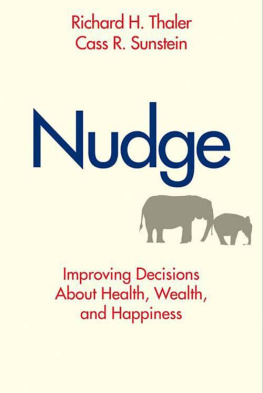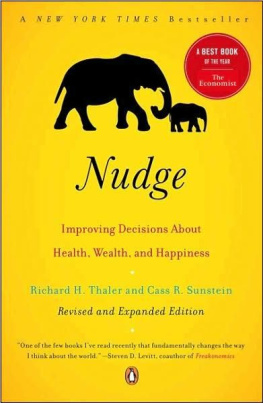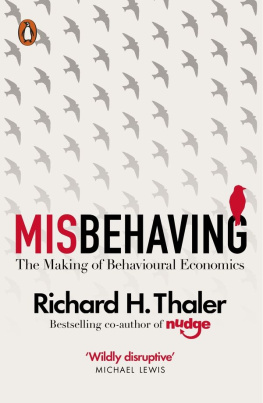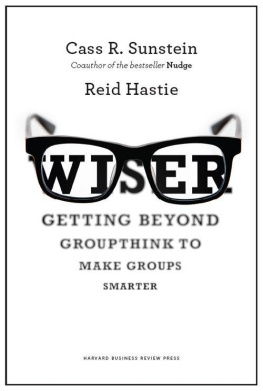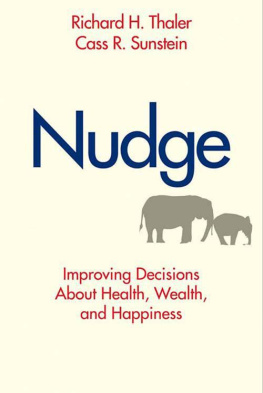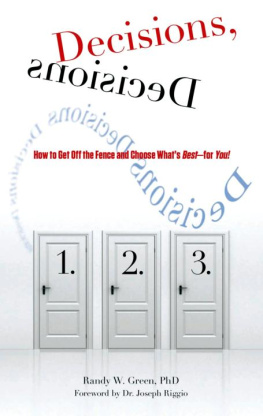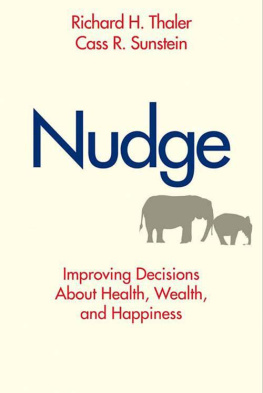Sunstein Cass R. - Nudge: Improving Decisions About Health, Wealth, and Happiness
Here you can read online Sunstein Cass R. - Nudge: Improving Decisions About Health, Wealth, and Happiness full text of the book (entire story) in english for free. Download pdf and epub, get meaning, cover and reviews about this ebook. City: London;New Haven;Conn, year: 2008, publisher: Yale University Press, genre: Politics. Description of the work, (preface) as well as reviews are available. Best literature library LitArk.com created for fans of good reading and offers a wide selection of genres:
Romance novel
Science fiction
Adventure
Detective
Science
History
Home and family
Prose
Art
Politics
Computer
Non-fiction
Religion
Business
Children
Humor
Choose a favorite category and find really read worthwhile books. Enjoy immersion in the world of imagination, feel the emotions of the characters or learn something new for yourself, make an fascinating discovery.
- Book:Nudge: Improving Decisions About Health, Wealth, and Happiness
- Author:
- Publisher:Yale University Press
- Genre:
- Year:2008
- City:London;New Haven;Conn
- Rating:4 / 5
- Favourites:Add to favourites
- Your mark:
Nudge: Improving Decisions About Health, Wealth, and Happiness: summary, description and annotation
We offer to read an annotation, description, summary or preface (depends on what the author of the book "Nudge: Improving Decisions About Health, Wealth, and Happiness" wrote himself). If you haven't found the necessary information about the book — write in the comments, we will try to find it.
Every day, we make decisions on topics ranging from personal investments to schools for our children to the meals we eat to the causes we champion. Unfortunately, we often choose poorly. The reason, the authors explain in this important exploration of choice architecture, is that, being human, we all are susceptible to various biases that can lead us to blunder. Our mistakes make us poorer and less healthy; we often make bad decisions involving education, personal finance, health care, mortgages and credit cards, the family, and even the planet itself.
Thaler and Sunstein invite us to enter an alternative world, one that takes our humanness as a given. They show that by knowing how people think, we can design choice environments that make it easier for people to choose what is best for themselves, their families, and their society. Using colorful examples from the most important aspects of life, Thaler and Sunstein demonstrate how thoughtful choice architecture can be established to nudge us in beneficial directions without restricting freedom of choice. Nudge offers a unique new takefrom neither the left nor the righton many hot-button issues, for individuals and governments alike. This is one of the most engaging and provocative books to come along in many years.
**
Amazon.com ReviewQuestions for Richard Thaler and Cass Sunstein
Amazon.com: What do you mean by nudge and why do people sometimes need to be nudged?
Thaler and Sunstein: By a nudge we mean anything that influences our choices. A school cafeteria might try to nudge kids toward good diets by putting the healthiest foods at front. We think that its time for institutions, including government, to become much more user-friendly by enlisting the science of choice to make life easier for people and by gentling nudging them in directions that will make their lives better.
Amazon.com: What are some of the situations where nudges can make a difference?
Thaler and Sunstein: Well, to name just a few: better investments for everyone, more savings for retirement, less obesity, more charitable giving, a cleaner planet, and an improved educational system. We could easily make people both wealthier and healthier by devising friendlier choice environments, or architectures.
Amazon.com: Can you describe a nudge that is now being used successfully?
Thaler and Sunstein: One example is the Save More Tomorrow program. Firms offer employees who are not saving very much the option of joining a program in which their saving rates are automatically increased whenever the employee gets a raise. This plan has more than tripled saving rates in some firms, and is now offered by thousands of employers.
Amazon.com: What is choice architecture and how does it affect the average persons daily life?
Thaler and Sunstein: Choice architecture is the context in which you make your choice. Suppose you go into a cafeteria. What do you see first, the salad bar or the burger and fries stand? Wheres the chocolate cake? Wheres the fruit? These features influence what you will choose to eat, so the person who decides how to display the food is the choice architect of the cafeteria. All of our choices are similarly influenced by choice architects. The architecture includes rules deciding what happens if you do nothing; whats said and what isnt said; what you see and what you dont. Doctors, employers, credit card companies, banks, and even parents are choice architects.
We show that by carefully designing the choice architecture, we can make dramatic improvements in the decisions people make, without forcing anyone to do anything. For example, we can help people save more and invest better in their retirement plans, make better choices when picking a mortgage, save on their utility bills, and improve the environment simultaneously. Good choice architecture can even improve the process of getting a divorce--or (a happier thought) getting married in the first place!
Amazon.com: You are very adamant about allowing people to have choice, even though they may make bad ones. But if we know whats best for people, why just nudge? Why not push and shove?
Thaler and Sunstein: Those who are in position to shape our decisions can overreach or make mistakes, and freedom of choice is a safeguard to that. One of our goals in writing this book is to show that it is possible to help people make better choices and retain or even expand freedom. If people have their own ideas about what to eat and drink, and how to invest their money, they should be allowed to do so.
Amazon.com: You point out that most people spend more time picking out a new TV or audio device than they do choosing their health plan or retirement investment strategy? Why do most people go into what you describe as auto-pilot mode even when it comes to making important long-term decisions?
Thaler and Sunstein: There are three factors at work. First, people procrastinate, especially when a decision is hard. And having too many choices can create an information overload. Research shows that in many situations people will just delay making a choice altogether if they can (say by not joining their 401(k) plan), or will just take the easy way out by selecting the default option, or the one that is being suggested by a pushy salesman.
Second, our world has gotten a lot more complicated. Thirty years ago most mortgages were of the 30-year fixed-rate variety making them easy to compare. Now mortgages come in dozens of varieties, and even finance professors can have trouble figuring out which one is best. Since the cost of figuring out which one is best is so hard, an unscrupulous mortgage broker can easily push unsophisticated borrowers into taking a bad deal.
Third, although one might think that high stakes would make people pay more attention, instead it can just make people tense. In such situations some people react by curling into a ball and thinking, well, err, Ill do something else instead, like stare at the television or think about baseball. So, much of our lives is lived on auto-pilot, just because weighing complicated decisions is not so easy, and sometimes not so fun. Nudges can help ensure that even when were on auto-pilot, or unwilling to make a hard choice, the deck is stacked in our favor.
Amazon.com: Are we humans just poorly adapted for making sound judgments in an increasingly fast-paced and complex world? What can we do to position ourselves better?
Thaler and Sunstein: The human brain is amazing, but it evolved for specific purposes, such as avoiding predators and finding food. Those purposes do not include choosing good credit card plans, reducing harmful pollution, avoiding fatty foods, and planning for a decade or so from now. Fortunately, a few nudges can help a lot. A few small hints: Sign up for automatic payment plans so you dont pay late fees. Stop using your credit cards until you can pay them off on time every month. Make sure youre enrolled in a 401(k) plan. A final hint: Read Nudge.
Review
How often do you read a book that is both important and amusing, both practical and deep? This gem of a book presents the best idea that has come out of behavioral economics. It is a must-read for anyone who wants to see both our minds and our society working better. It will improve your decisions and it will make the world a better place.-Daniel Kahneman, Princeton University, Nobel Laureate in Economics (Daniel Kahneman )
In this utterly brilliant book, Thaler and Sunstein teach us how to steer people toward better health, sounder investments, and cleaner environments without depriving them of their inalienable right to make a mess of things if they want to. The inventor of behavioral economics and one of the nations best legal minds have produced the manifesto for a revolution in practice and policy. Nudge wont nudge you-it will knock you off your feet.-Daniel Gilbert, professor of psychology, Harvard University, Author of Stumbling on Happiness (Daniel Gilbert )
This is an engaging, informative, and thoroughly delightful book. Thaler and Sunstein provide important lessons for structuring social policies so that people still have complete choice over their own actions, but are gently nudged to do what is in their own best interests. Well done.-Don Norman, Northwestern University, Author of The Design of Everyday Things and The Design of Future Things (Don Norman )
This book is terrific. It will change the way you think, not only about the world around you and some of its bigger problems, but also about yourself.-Michael Lewis, author of The Blind Side: Evolution of a Game and Liars Poker (Michael Lewis )
Two University of Chicago professors sketch a new approach to public policy that takes into account the odd realities of human behavior, like the deep and unthinking tendency to conform. Even in areas-like energy consumption-where conformity is irrelevant. Thaler has documented the ways people act illogically.-Barbara Kiviat, Time (Barbara Kiviat Time )
Richard Thaler and Cass Sunsteins Nudge is a wonderful book: more fun than any important book has a right to be-and yet it is truly both.-Roger Lowenstein, author of When Genius Failed (Roger Lowenstein )
A manifesto for using the recent behavioral research to help people, as well as government agencies, companies and charities, make better decisions.-David Leonhardt, The New York Times Magazine (David Leonhardt The New York Times Magazine )
I love this book. It is one of the few books Ive read recently that fundamentally changes the way I think about the world. Just as surprising, it is fun to read, drawing on examples as far afield as urinals, 401(k) plans, organ donations, and marriage. Academics arent supposed to be able to write this well.-Steven Levitt, Alvin Baum Professor of Economics, University of Chicago Graduate School of Business and co-author of Freakonomics: A Rogue Economist Explores the Hidden Side of Everything (Steven Levitt )
Sunstein Cass R.: author's other books
Who wrote Nudge: Improving Decisions About Health, Wealth, and Happiness? Find out the surname, the name of the author of the book and a list of all author's works by series.

